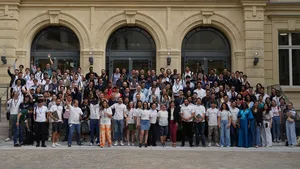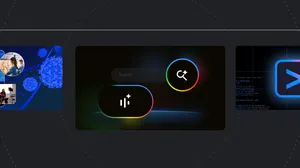How we’re using AI to connect people to health information

Information is a determinant of health. Access to easy-to-understand, relatable, evidence-based information and insights helps people better navigate their health. I learned this during my years practicing medicine, and we firmly believe it at Google. You can learn more about this concept of how information affects health outcomes in our recently published paper in Nature Medicine.
At our annual Google Health event The Check Up, teams from across the company came together to show how AI is helping us connect people to health information and insights that matter to them, in ways that are meaningful and helpful. Here’s a look at the updates we shared.

Updates on making Search information more visual
Some health questions are difficult to describe in words alone, like skin discoloration or another abnormality on your skin. Last year, rather than describing through words, we made it possible to use Google Lens to search what you see on your skin. Take a picture of your skin with Lens in the Google app, and you will find visually-similar matches from the web to inform your search. Today this AI-powered feature is now available in over 150 countries and works even if you are not sure how to describe something on your body, like a rash on your hand.
This is an image comparison feature that matches to images available publicly on the world wide web. This feature does not constitute a medical analysis of the image. Search results are informational only and not a diagnosis. Consult your medical authority for advice.
Another part of making health information accessible is presenting it in formats you can easily understand — whether that is with visuals, text or video. We have added images and diagrams from high quality sources on the web that make it easier to understand symptoms, like neck pain, for example. And we are working to make these more visual results available on mobile for health conditions, such as migraines, kidney stones, or pneumonia. Over the next few months we will be rolling this update out globally.
No matter how you best understand information, our products and tools help you find answers to your health questions.
YouTube’s work to bring authoritative, health-related content to more people
At YouTube, we are working to provide people with more access to quality health information and help creators reach more audiences. Our AI-powered dubbing tool, Aloud, streamlines the video translation and dubbing process at no cost, helping bridge that gap for creators. The tool has allowed institutions, such as Mass General Brigham, to dub first-aid videos from English into Spanish, providing potentially life-saving information to more people. Now they are expanding their efforts to include videos related to chronic conditions, like COPD and cancer.
We are also working to break down language barriers to bring more helpful information to health professionals. Starting today, a new animation-style course on the Stanford Medicine Continuing Medical Education YouTube channel will be available in Spanish for free. The course, which helps health professionals recognize and address implicit bias in clinical practice to better advocate for patients from underrepresented and underserved communities, was translated and dubbed using Aloud and is bridging the language gap to ultimately reach more individuals with this crucial knowledge.
Deeper health insights with Fitbit
Fitbit synthesizes your personal health and fitness data so you can track it in the Fitbit app. Our team is now building personal AI features to bring even more tailored, personalized insights that you can explore based on your unique needs and preferences.
Fitbit Labs, introduced last year, will give Premium users early access to experimental AI features to test out and give feedback on. Building on Google’s AI expertise, Fitbit Labs can help you get a fuller understanding of your health data and connect the dots across that information. You will be able to ask questions in a natural way and create charts just for you to help you understand your own data better. For example, you could dig deeper into how many active zone minutes (AZMs) you get and the correlation with how restorative your sleep is.
An example of Fitbit Labs features that will be available later this year to a limited number of Android users who are enrolled in the Fitbit Labs program in the Fitbit mobile app.

Fitbit and Google Research are working together with health and wellness experts, doctors and certified coaches to create a new model for health and wellness. This new Personal Health Large Language Model will power future AI features across our portfolio.

At Google, we believe AI has the potential to transform health for everyone, everywhere, not just some people in some places. These are just a few ways we are using AI to improve health by bringing high-quality information to people around the world through the products and tools they use everyday.







